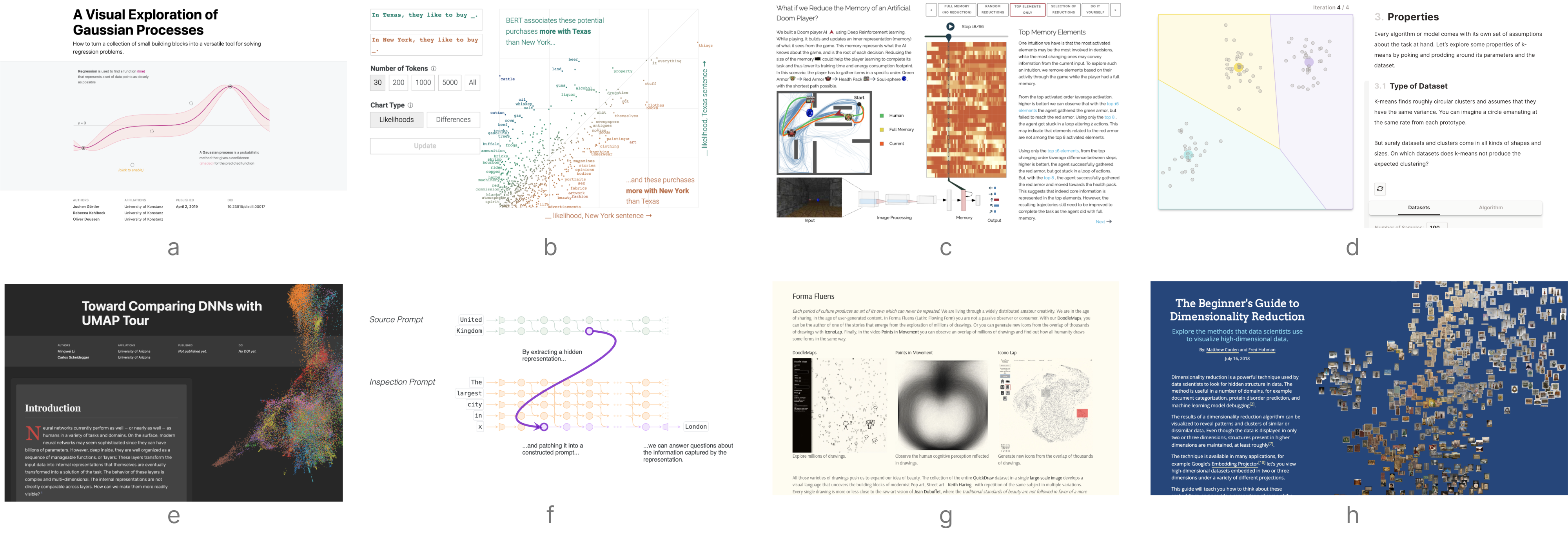8th Workshop on
Visualization for AI Explainability
November 2, 2025 at IEEE VIS in Vienna, Austria

The role of visualization in artificial intelligence (AI) gained significant attention in recent years. With the growing complexity of AI models, the critical need for understanding their inner-workings has increased. Visualization is potentially a powerful technique to fill such a critical need.
The goal of this workshop is to initiate a call for 'explainables' / 'explorables' that explain how AI techniques work using visualization. We believe the VIS community can leverage their expertise in creating visual narratives to bring new insight into the often obfuscated complexity of AI systems.

- (a) A Visual Exploration of Gaussian Processes by Görtler, Kehlbeck, and Deussen (VISxAI 2018)
- (b) What Have Language Models Learned? by Adam Pearce (VISxAI 2021)
- (c) What if we Reduce the Memory of an Artificial Doom Player? by Jaunet, Vuillemot, and Wolf (VISxAI 2019)
- (d) K-Means Clustering: An Explorable Explainer by Yi Zhe Ang (VISxAI 2022)
- (e) Comparing DNNs with UMAP Tour by Li and Scheidegger (VISxAI 2020)
- (f) Can Large Language Models Explain Their Internal Mechanisms? by Hussein, Ghandeharioun, Mullins, Reif, Wilson, Thain, Dixon (VISxAI 2024)
- (g) FormaFluens Data Experiment by Strobelt, Phibbs, and Martino
- (h) The Beginner's Guide to Dimensionality Reduction by Conlen and Hohman (VISxAI 2018)
Important Dates
Program Overview
All times in CET (UTC +1).
| 9:00am | Welcome from the Organizers |
| 9:10 -- 10:30 | Session I: Lightning Talks Learning as Choosing a Loss Distribution Matthew J Holland LIME and SHAP Explained: From Computation to Interpretation Aeri Cho, Jeongmin Rhee, Seokhyeon Park, Jinwook Seo Transformer Explainer: LLM Transformer Model Visually Explained Aeree Cho, Grace C. Kim, Alexander Karpekov, Alec Helbling, Zijie J. Wang, Seongmin Lee, Benjamin Hoover, Duen Horng Chau The Mystery of In-Context Learning: How Transformers Learn Patterns Sundara Srivathsan, Lighittha PR, Prithivraj S, Suganya Ramamoorthy ICL‑Scope: Peering Inside In‑Context Learning with Real‑Time Interactive Visualisation Bhaskarjit Sarmah, Reetu Raj Harsh ESCAPE - Explaining Stable Diffusion via Cross Attention Maps and Prompt Editing Diego Zafferani, Giovanni De Muri, Johanna Hedlund Lindmar, Akmal Ashirmatov, Sinie van der Ben, Rita Sevastjanova, Mennatallah El-Assady Patch Explorer Imke Grabe, Jaden Fiotto-Kaufman, Rohit Gandikota, David Bau GFlowNet Playground - Theory and Examples for an Intuitive Understanding Florian Holeczek, Alexander Hillisch, Andreas Hinterreiter, Alex Hernández-García, Marc Streit, Christina Humer The Illustrated Evo2 Jared Wilber, Farhad Ramezanghorbani, Tyler Carter Shimko, John St John, David Romero |
| 10:30 -- 11:00 | Break |
| 11:00 -- 12:30 | Session II: VISxAI Unconf Come by to discuss what's hot in VIS + AI, meet new people, and build community! 1 hour: break outs. 30min: share outs. |
| 12:30 -- 2:00 | Lunch Break |
| 2:00 -- 3:30 | Session III: Fireside Chat (with original VISxAI Organizers!): Hendrik Strobelt, Adam Perer, Menna El-Assady How has the intersection of visualization and machine learning changed since the first VISxAI (2018)? |
| 3:30 -- 4:00 | Break |
| 4:00 -- 5:30 | Session IV: Closing Keynote: Martin Wattenberg - @wattenberg |
| 5:30 | Closing |
Call for Participation
To make our work more accessible to the general audience, we are soliciting submissions in a novel format: blog-style posts and jupyter-like notebooks. In addition we also accept position papers in a more traditional form.
Hall of Fame
Each year we award Best Submissions and Honorable Mentions. Congrats to our winners!